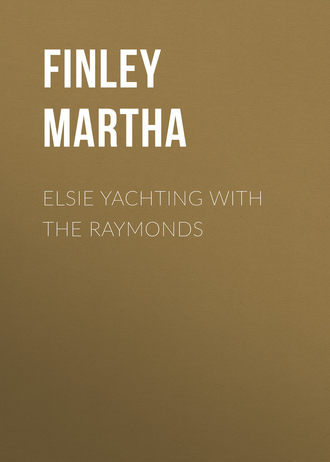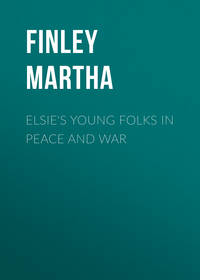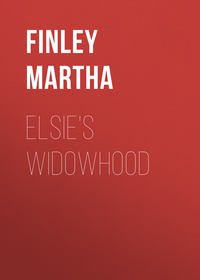 полная версия
полная версияElsie Yachting with the Raymonds
"I too; oh, very much!" said Lulu. "Please take us there, – won't you, Papa?"
"I fear there will be hardly time, my dears; but I will see about it," was the indulgent reply.
"You have been here before, Raymond?" Mr. Keith said inquiringly.
"Yes; on my first bridal trip," the Captain answered in a low, moved tone, and sighing slightly as the words left his lips.
"With our own mother, Papa?" asked Lulu, softly, looking up into his face with eyes full of love and sympathy.
"Yes, daughter; and she enjoyed the view very much as you are doing now."
"I'm glad; I like to think she saw it once."
An affectionate pressure of the hand he held was his only reply. Then turning to his friend, "It is a grand view, Keith," he said; "and one that always stirs the patriotism in my blood, inherited from ancestors who battled for freedom in those Revolutionary days."
"It is just so with myself," replied Keith; "and the view is a grand one in itself, though there were no such association, – a superb panorama! The beautiful, majestic river sweeping about the rock-bound promontory below us there, with its tented field; yonder the distant spires of Newburgh, and the bright waters of its bay, seen through that magnificent cleft in the hills," pointing with his finger as he spoke, – "ah, how often I have seen it all in imagination when out in the far West scouting over arid plains, and among desolate barren hills and mountains, where savages and wild beasts abound! At times an irrepressible longing for this very view has come over me, – a sort of homesickness, most difficult to shake off."
"Such as years in the ports of foreign lands have sometimes brought upon me," observed the Captain, giving his friend a look of heartfelt sympathy.
"Dear Papa, I'm so glad that is all over," Lulu said softly, leaning lovingly up against him as she spoke, and again lifting to his eyes her own so full of sympathy and affection. "Oh, it is so pleasant to have you always at home with us!"
A smile and an affectionate pressure of the little soft white hand he held were his only reply.
"Ah, my little girl, when Papa sees a man-of-war again, he will be likely to wish himself back in the service once more!" remarked Keith, in a sportive tone, regarding her with laughing eyes.
"No, sir, I don't believe it," she returned stoutly. "Papa loves his home and wife and children too well for that; besides, he has resigned from the navy, and I don't believe they'd take him back again."
"Well, Lu," said Max, "that's a pretty way to talk about Papa! Now, it's my firm conviction that they'd be only too glad to get him back."
"That's right, Max; stand up for your father always," laughed Keith. "He is worthy of it; and I don't doubt the government would be ready to accept his services should he offer them."
"Of course," laughed the Captain; "but I intend to give them those of my son instead," turning a look upon Max so proudly tender and appreciative that the lad's young heart bounded with joy.
"Ah, is that so?" said Keith, gazing appreciatively into the lad's bright young face. "Well, I have no doubt he will do you credit. Max, my boy, never forget that you have the credit of an honourable name to sustain, and that in so doing you will make your father a proud and happy man."
"That is what I want to do, sir," replied Max, modestly. Then hastily changing the subject, "Papa, is that town over there Phillipstown?"
"Yes; what do you remember about it?"
"That a part of our Revolutionary army was camped there in 1781. And there, over to the left, is Constitution Island, – isn't it, sir?"
"Yes," answered his father; then went on to tell of the building of the fort from which the island takes its name, and its abandonment a few days after the capture by the British of Forts Clinton and Montgomery, near the lower entrance to the Highlands, in 1777.
"Such a pity, after they had been to all the expense and trouble of building it!" remarked Lulu.
"Yes, quite a waste," said Max; "but war's a wasteful business anyway it can be managed."
"Quite true, Max," said, Mr. Keith; "and soldier though I am, I sincerely hope we may have no more of it in this land."
"No, sir; but the best way to keep out of it is to show ourselves ready for self-defence. That is what Papa says."
"And I entirely agree with him. Shall we go now, Raymond, and see what of interest is to be found in the buildings and about the grounds of the academy?"
The Captain gave a ready assent, and they retraced their steps, he helping Lulu down the mountain as he had helped her up.
Keith took them, first, to the artillery laboratory to see, as he said, some trophies and relics of the Revolution. Conducting them to the centre of the court, "Here," he remarked, "are some interesting ones," pointing, as he spoke, to several cannon lying in a heap, and encircled by some links of an enormous chain.
"Oh," exclaimed Max, "is that part of the great chain that was stretched across the Hudson, down there by Constitution Island, in the time of the Revolution?"
"Yes," replied Keith. "And these two brass mortars were taken from Burgoyne at Saratoga; this larger one, Wayne took from the British at Stony Point. I dare say you and your sister are acquainted with the story of that famous exploit."
"Oh, yes, sir!" they both replied; and Lulu asked, "Is that the English coat-of-arms on the big cannon?"
Her look directed the query to her father, and he answered, "Yes."
"And what do these words below it mean, Papa, – 'Aschaleh fecit, 1741'?"
"Aschaleh is doubtless the name of the maker; 'fecit' means he executed it, and 1741 gives the time when it was done."
"Thank you, sir," she said. "Is there any story about that one?" pointing to another cannon quite near at hand.
"Yes," he said; "by its premature discharge, in 1817, a cadet named Lowe was killed. In the cemetery is a beautiful monument to his memory."
"Here are two brass field-pieces, each marked 'G. R.,'" said Max. "Do those letters stand for George Rex, – King George, – Papa?"
"Yes; that was the monogram of the king."
"And the cannon is fourteen years younger than those others," remarked Lulu; "for, see there, it says, 'W. Bowen fecit, 1755.'"
"Oh, here's an inscription!" exclaimed Max, and read aloud, "'Taken from the British army, and presented, by order of the United States, in Congress assembled, to Major-General Green, as a monument of their high sense of the wisdom, fortitude, and military talents which distinguished his command in the Southern department, and of the eminent services which, amid complicated dangers and difficulties, he performed for his country. October 18th, 1783.' Oh, that was right!" supplemented the lad, "for I do think Green was a splendid fellow."
"He was, indeed!" said the Captain; "and he has at last been given such a monument as he should have had very many years sooner."
"Where is it, Papa?" asked Lulu.
"In Washington. It is an equestrian statue, by Henry Kirke Brown."
"Yes; and very glad I am that even that tardy act of justice has been done him, – one of the bravest and most skilful commanders of our Revolutionary War," remarked Mr. Keith. Then he added, "I think we have seen about all you will care for here, Raymond, and that you might enjoy going out upon the parade-ground now. The sun is near setting, and the battalion will form presently, and go through some interesting exercises."
"Thank you!" the Captain said. "Let us, then, go at once, for I see Max and his sister are eager for the treat," he added, with a smiling glance from one brightly expectant young face to the other.
CHAPTER IV
They reached the parade-ground just in time to see the battalion forming under arms, and Max and Lulu watched every movement with intense interest and delight, – the long skirmish lines firing in advance or retreat, picking off distant imaginary leaders of a pretended enemy in reply to the ringing skirmish calls of the key-bugles, deploying at the run, rallying at the reserves and around the colours.
That last seemed to delight Lulu more than anything else. "Oh," she exclaimed, "isn't it lovely! Wouldn't they all fight for the dear old flag if an enemy should come and try to tear it down!"
"I'm inclined to think they would," returned Mr. Keith, smiling at her enthusiasm. "Now look at the flag waving from the top of the staff yonder."
The words had scarcely left his lips when there came the sudden bang of the sunset gun, and the flag quickly fluttered to the earth.
Then followed the march of the cadets to their supper, and our little party turned about and went in search of theirs.
On leaving the table they went out upon the hotel porch and seated themselves where the view was particularly fine, the gentlemen conversing, Max and Lulu listening, both tired enough to be quite willing to sit still.
The talk, which was principally of ordnance and various matters connected with army and navy, had greater interest for the boy than for his sister, and Lulu soon laid her head on her father's shoulder, and was presently in the land of dreams.
"My poor, tired, little girl!" he said, low and tenderly, softly smoothing the hair from her forehead as he spoke.
At that she roused, and lifting her head, said coaxingly, "Please don't send me to bed yet, Papa! I'm wide awake now."
"Are you, indeed?" he laughed. "I think those eyes look rather heavy; but you may sit up now if you will agree to sleep in the morning when Max and I will probably be going out to see the cadets begin their day. Would you like to go, Max?"
"Yes, indeed, sir!" answered Max, in eager tones; "it's about five o'clock we have to start, – isn't it?"
"Yes, Max. Lieutenant Keith has kindly offered to call us in season, and become our escort to the camp."
"Oh, Papa, mayn't I go too?" pleaded Lulu, in the most coaxing tones. "I won't give you the least bit of trouble."
"You never do, daughter, in regard to such matters; you are always prompt, and ready in good season."
"Then do you say I may go, Papa?"
"Yes, if you will go to bed at once, in order to secure enough sleep by five o'clock in the morning."
"Oh, thank you, sir! Yes, indeed, I will," she said, hastily rising to her feet, and bidding good-night to Mr. Keith.
"I too," said Max, following her example.
"Good children," said their father; then noticing the longing look in Lulu's eyes, he excused himself to his friend, saying he would join him again presently, and went with them.
"That is a beautiful, bright, engaging, little girl of yours, Raymond, – one that any father might be proud of," remarked Keith when the Captain had resumed the seat by his side.
"She seems all that to me; but I have sometimes thought it might be the blindness of parental affection that makes the child so lovely and engaging in her father's eyes," returned the Captain, in tones that spoke much gratification.
"I think, indeed I am sure, not," returned Keith. "About how old is she?"
"Thirteen. Actually, she'll be a woman before I know it!" was the added exclamation in a tone of dismay. "I don't like the thought of losing my little girl even in that way."
"Ah, you'll be likely to lose her in another before many years!" laughed his friend. "She'll make a lovely woman, Raymond!"
"I think you are right," answered the father; "and I confess that the thought of another gaining the first place in her heart – which I know is mine now – is far from pleasant to me. Well, it cannot be for some years yet, and I shall try not to think of it. Perhaps she may never care to leave her father."
"I don't believe she will if she is wise. You are a fortunate man, Raymond! Your son – the image of his father – is not less attractive than his sister, and evidently a remarkably intelligent lad. He will make his mark in the navy; and I dare say we shall have the pleasure of seeing him an admiral by the time we – you and I – are gray-headed, old veterans."
"Perhaps so," returned the Captain, with a pleased smile; "but promotion is slow in the navy in these days of peace."
"Quite true; and as true of the army as of the navy. But even that is to be preferred to war, – eh, Raymond?"
"Most decidedly," was the emphatic reply.
"You leave for home to-morrow evening, I think you said?" was Keith's next remark, made in an inquiring tone.
"That is my plan at present," replied the Captain, "though I would stay a little longer rather than have the children disappointed in their hope of seeing everything about here that has any connection with the Revolution."
"They seem to be ardent young patriots," said Keith. "It does one good to see their pride and delight in the flag. How their eyes shone at the sight of the rally round the colours."
"Yes; and they feel an intense interest in everything that has any connection with the Revolutionary struggle. They get it in the blood; and it has been their father's earnest endeavour to cultivate in them an ardent love of country."
"In which he has evidently been remarkably successful," returned Keith. "I am much mistaken if that boy does not do you great credit while in the Naval Academy, and, as I remarked a moment since, after fairly entering the service."
"A kind and pleasant prediction, Keith," the Captain said, giving his friend a gratified look.
"How many children have you, Raymond?" was the next question.
"Only five," the Captain said, with a happy laugh, – "five treasures that should, it seems to me, make any man feel rich; also, a sweet, beautiful, young wife, who is to her husband worth far more than her weight in gold. 'Her price is above rubies.' And you, Keith, – you have not told me whether you have yet found your mate."
"No, not yet. I sometimes think I never shall, but shall soon become a confirmed old bachelor," Keith replied. Then, after an instant's pause, "I wonder if Lulu's father would give her to me should I wait patiently till she is old enough to know her own mind in such matters, and then succeed in winning her heart?"
"Ah, Keith, is that a serious thought or a mere idle jest?" queried the Captain, turning a surprised and not altogether pleased look upon his friend.
"A sort of mixture of the two, I believe, Raymond," was the laughing reply; "but I haven't the least idea of putting any such mischief into your daughter's head, – at least, not at present. But if I ask your permission half a dozen years hence to pay my court to her, I hope it will not be refused."
"Well, Keith," the Captain said, after a moment's silence, "I should be very loath to stand in the way of your happiness, – still more of that of my dear daughter; but the time is so far off that we need not discuss the question now. My little girl seems still the merest child, with no thought of the cares, pleasures, and duties of womanhood; and I wish to keep her so as long as I can. That is one reason why I rejoice in being able to educate her myself in our own home; and thus far the loves of the dear ones in it have seemed all-sufficient for her happiness. And I own to being particularly pleased with her oft-repeated assurance that she loves Papa better than she does any one else in all the wide world."
"Ah, I do not wonder that she does, for her father is altogether worthy of all the love she can give him!" Keith said, with a half-sigh, thinking of the loneliness of his lot compared with that of the Captain.
"Keith," the Captain said, after a moment's silence, "you tell me your furlough will not expire for some weeks yet. Can you not spend them with us at the sea-shore?"
Donald demurred a little at first, saying he had made other plans; and besides, his going might interfere with his cousins' arrangements.
"Not the slightest danger of that," the Captain averred; "and I am certain that one and all will be delighted to see you."
"And I own to being fairly hungry for a sight of them," laughed Donald. "So, Raymond, your invitation is accepted, and on your own head be the consequences."
"No objection to that; I'm delighted to have you on any terms, reasonable or otherwise," the Captain said, with his pleasant smile.
Max and Lulu had an hour or more of good refreshing sleep before the two gentlemen separated for the night.
Captain Raymond went very softly into Lulu's room, and stood for a moment by the bedside looking fondly down into the rosy, sleeping face, then, bending over her, kissed her tenderly on cheek and lip and brow.
Her eyes opened wide and looked up into his, while a glad smile broke over her face.
"You dear, good Papa, to come in and kiss me again!" she said, putting her arm round his neck and returning his caresses. "Oh, I do think I have just the very dearest, kindest, best father in the whole wide world!"
"That's rather strong, isn't it?" he returned, laughing, but at the same time gathering her up in his arms for a moment's petting and fondling. Then, laying her down again, "I did not mean to wake you," he said; "and I want you now to go to sleep again as fast as you can, because, though to-morrow will, I hope, be a very enjoyable day to you and Max, it is probable you will find it quite fatiguing also."
"Yes, sir; but I don't mean to think about it now, else I'd be wide awake presently, and maybe not sleep any more to-night," Lulu answered drowsily, her eyes closing while she spoke.
He was turning away, when she roused sufficiently to ask another question. "Papa, will you please wake me when the time comes to get up?"
"Yes, daughter," he replied. "Do not let the fear of not waking in season rob you of a moment's sleep. I think you may safely trust to your father to attend to that for you."
It seemed to Lulu that but a few moments had passed when her father's voice spoke again close to her side.
"Wake up now, little daughter, if you want to go with Papa and Max to see what the cadets will be doing in their camp for the next hour or so."
"Oh, yes, indeed, I do!" she cried, wide awake in an instant. "Good-morning; and thank you ever so much for calling me, dear Papa!" and with the words her arms were round his neck, her kisses on his cheek.
He gave her a hearty embrace in turn; and then, with a "Now, my darling, you must make haste, we have only ten minutes; but I shall bring you back to rearrange your toilet before going down to breakfast," he released her and went back to his own room.
Lulu made quick work of her dressing, and when her father tapped at her door to say it was time to go, was quite ready.
They found Mr. Keith waiting on the porch, exchanged a pleasant "good-morning" with him, and at once started for the camp.
Max and Lulu were in gayest spirits, and were allowed to laugh and talk till the little party drew near the camp, when their father bade them be quiet, and amuse themselves for the present by looking and listening.
He spoke in a kind, pleasant tone, and they obeyed at once.
Down by the guard-tents they could see a dim, drowsy gleam, as of a lantern; the gas-jets along the way seemed to burn dimly, too, as the daylight grew stronger, and up about the hill-tops on the farther side of the river the sky was growing rosy and bright with the coming day. But all was so quiet, so still, where the tents were that it seemed as if everybody there must be still wrapped in slumber; and Lulu was beginning to think Mr. Keith must have called for them a little earlier than necessary, when a sudden gleam and rattle among the trees almost made her jump, so startled was she, while at the same instant a stern, boyish voice called out, "Who comes there?" and a sentry stood before them wrapped in an overcoat, – for the morning was very cool up there among the mountains, – and with the dew dripping from his cap.
"Friends, with the countersign," replied Mr. Keith.
"Halt, friends! Advance one with the countersign," commanded the sentry; and while the Captain and his children stood still where they were, Mr. Keith stepped up to the levelled bayonet and whispered a word or two in the ear of the young sentinel which at once caused a change in his attitude toward our party, – respectful attention taking the place of the fierce suspicion. "Advance, friends!" he said, bringing his heels together and his rifle to the carry, then stood like a statue while they passed on into the camp he guarded.
Max and Lulu, remembering their father's order to them to keep quiet, said nothing, but were careful to make the very best use of their eyes.
Down by the tents, on the south and east sides, they could see sentries pacing their rounds, but there was as yet no sound or movement among the occupants.
Some drummer-boys were hurrying over the plain toward the camp, while a corporal and two cadets were silently crossing to the northeast corner, where stood a field-piece dripping with dew.
Max motioned to Lulu to notice what they were doing, and as he did so they had reached the gun, and there was a dull thud as they rammed home their cartridge.
The drummer-boys were chattering together in low tones, glancing now and again at the clock in the "Academic" tower over on the other side of the plain. Suddenly a mellow stroke began to tell the hour, but the next was drowned in the roar of the gun as it belched forth fire and smoke, while at the same instant drum and fife broke forth in the stirring strains of the reveille.
Lulu almost danced with delight, looking up into her father's face with eyes shining with pleasure. His answering smile was both fond and indulgent as he took the small white hand in his with a loving clasp; but it was no time for words amid the thunder of the drums playing their march in and about the camp.
Lulu could see the tent-flaps raised, drowsy heads peering out, then dozens of erect, slender lads, in white trousers and tight-fitting coatees, coming out with buckets, and hurrying away to the water-tanks and back again.
Presently the drums and fifes ceased their music; there was a brief interval of silence, while the streets of the camp filled up with gray and white coated figures. Then came another rattle of the drums like a sharp, quick, imperative call.
"Fall in!" ordered the sergeants; and like a flash each company sprang into two long columns.
"Left face!" ordered each first sergeant, while the second sergeant, answering to his own name, was watching with eagle eye a delinquent who came hurrying on, and took his place in the ranks too late by a full half-second.
"Ah," exclaimed Keith, "that poor lad will be reported as too late at reveille!"
Lulu gave him a look of surprise. "Dear me," she said to herself, "if Papa was that strict with his children what ever would become of me?"
But the first sergeant was calling the roll, and she listened with fresh astonishment as he rattled off the seventy or eighty names without so much as an instant's pause, using no list, and seeming to recognize each lad as he answered "Here."
It took scarcely a minute; then at a single word the ranks scattered, the lads hurrying away to their tents, while the first sergeant made a brief report to the captain, who stood near, then the captain to the officer of the day.
Our little party had now seated themselves where a good view of the camp might be obtained, and Max and Lulu watched with great interest what was going on there. They could see the lads pull off their gray coats, raise their tent-walls to give free circulation through them to the sweet morning air, pile up their bedding, and sweep their floors.
Lulu gave her father an inquiring look, and he said, "What is it, daughter? You may talk now, if you wish."
"I was just wondering if you had to do such work as that at Annapolis," she said in reply.
"I did," he responded, with a smile, "and thought you had heard me speak of it."
"Maybe I have," she said, with a tone and look as if trying to recall something in the past. "Oh, yes, I do remember it now! And I suppose that's the reason you have always been so particular with us about keeping our rooms nice and neat."
"Partly, I believe," he returned, softly patting the hand she had laid on his knee; "but my mother was very neat and orderly, and from my earliest childhood tried to teach me to be the same."
"And I think I'll find it easier because of your teachings, sir," remarked Max.
"I hope so," the Captain said; "you'll find you have enough to learn, my boy, without that."









